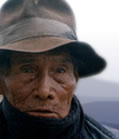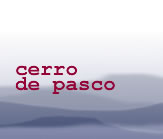THEMES IN THIS
TESTIMONY
Compensation

Education

Employment and Income

Environment

Festivals

Health

Industry

Click on arrows
to find more
testimonies
featuring
these themes
|
|
Sex
|
male
|
|
|
Age
|
old
|
|
|
Occupation
|
retired miner
|
|
|
Location
|
Huaracayo, Yauli region
|
|
|
Date
|
1995
|
|
summary
Originally from the community of Huaracayo, Victor admits he did not like life at his village due to a lack of entertainment or the chance to work independently. Aged 20 he migrates to Lima to find work. Unsuccessful, he moves to La Oroya and works at the smelter. He stresses the pollution, the harsh and exploitative conditions of working and the lack of a means to protest.
Victor retires after three years due to health fears and moves to his wife’s village, Jauja. However, they are unable to make a living through agriculture. They move back to La Oroya to look for other work, for example at a bakery, but the wages are not sufficient. They move to the mountains to work with the Spanish company, Santander, draining the lakes for minerals.
Again he describes the dangerous and harsh conditions of his work and the lack of safety equipment or concern shown by the company. Many colleagues died, became terminally ill or had accidents. By the ‘70s, the workers began to protest and organise themselves. The labour union changed some things, ‘made them respect us’ and Victor speaks with some pride of his own union record. The comuneros (registered community members with rights and responsibilities) turned to the union for help but did not have the same clout. Only later, with the help of lawyers and union advisors could they make claims for compensation. Victor retired after 25 years, once he had fulfilled his responsibility to his sons and put them through education.
Several times, Victor highlights the paradoxes of his position. He needs a secure job and fixed salary in order to fulfil his responsibilities to his family. But he is not happy with the harsh conditions and the affects on his health from working in industry. However, after attempts at finding other jobs, he goes back to mining as it offers him the most security. He stresses his and his co-workers’ vulnerability and lack of power to protest for fear of risking their jobs. Only later, when they are unionised, does he feel they received any respect or could demand some change.
Victor expresses a strong commitment to his wife and family and a pride in his sons’ educational achievements. However, he appears to show no lasting attachment to his old village and community. In contrast to other testimonies which speak of continuity and the need to remember old traditions, he feels no such nostalgia. Much of his life has been spent in mining camps made up of different community groups. He adds that on his occasional visits back to his home village, it has become more backward and offers even fewer opportunities to young people.
Overall, the interview provides a good insight into the lack of choice faced by people like Victor. Mining means exploitation and health risks, if security; traditional agriculture is hardly viable anymore. Significantly, his children have chosen neither route and he hopes that their lives will be better than his.
detailed breakdown
|
You will need a password from Panos to view the full
transcript of the interview. To apply for a password, click here.
Once you have a password, click here to go to the beginning
of the transcript. You can also click on any section of the
breakdown of content below and go straight to the
corresponding part of the transcript.
|
| Section 1-2 |
Description of parents’ lives as communeros; growing crops, rearing animals.
Money was not necessary; they didn’t have to sell anything but would sometimes exchange. Not like today when everything is commercialised. His father was a weaver but did not teach this skill to his sons. He admits did not like village life (lack of entertainment and also father owned everything and “gave the orders”). So at the age of 20 he went to Lima to find work.
|
| Section 3 |
Fragmentation of family land on inheritance.
|
| Section 4 |
Father never taught any of his children how to weave.
Lack of work in the city. Describes way Lima has changed since he was there.
|
| Section 5 |
Moves to La Oroya and smelter job with Cerro de Pasco company. Description of harsh conditions of work, low pay and exploitation by the gringos. Inability to protest, fear of being sacked. No political grouping.
|
| Section 5-6 |
Describes chemical pollution and the lack of protection provided for work force.
|
| Section 6 |
Marriage within mining community and started a family. Describes occupational health hazards, particularly from working in the furnace.
|
| Section 7 |
Use of herbal medicine to counteract skin problems.
Beginning to protest but still afraid to strike in case they lost their jobs. Resigns after three years and goes to live in his wife’s village, Jauja. Describes hardship of making a living; lack of marketing facilities makes single crop agriculture impossible. Back to La Oroya looking for other work.
|
| Section 8 |
Worked in a bakery but the wage was not enough to live on. Still did not return to village. Move to Santander in the mountains; harsh conditions. Working for Spanish company, building facilities for a camp near the lake. Involved in draining two out of three lakes in the area.
|
| Section 9 |
Extracting minerals, silver, zinc. Environmental damage.
Mixed communities working at the site; locals and people from elsewhere
Describes affects of mining on local farming communities; damage to pasture.
|
| Section 10 |
Protest of local farming community; knocking down company buildings. Over time became more conscious of fact that the company was “hurting the campesinos”. Mining camp very close to local community and had a good relationship with them, joined in their customs. Description of differences between the customs of La Oroya and those of his own town, in terms of food, dances, traditions and festivals.
|
| Section 11 |
Again emphasises the need for security of employment versus the desire to move and change jobs. Stayed 25 years with Santander. Lack of protective gear; lots of accidents. Recommendations from safety engineer ignored by company directors.
|
| Section 12 |
By ‘70s protesting more. Organised into labour union. Achievements of the union: safety equipment, services relating to occupational health and illness. Pride in his own union record. Explains his position: not easy to find work, has a responsibility to his family and thus values the security and fixed salary which mining gave him, but unhappy about his health.
|
| Section 13 |
Retired once had fulfilled his responsibility to put his sons through university education. Describes three children’s educational achievements. Stresses his desire for their lives to be different from his. Feels happy that all his children have professional work.
|
| Section 14 |
Explains after he left his village he lost interest in it and would only visit occasionally. Hints at family difficulties - his father’s strong personality- as possible reason why he did not return earlier to his village (when pressed by interviewer). He feels his old community has not changed that much, if anything it has become more backward with even fewer opportunities for young people. Stresses that he does not want to return to his community for his retirement. He wants to be near his children in La Oroya.
.
|
|


